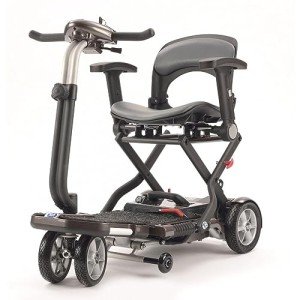Embracing Freedom: A Comprehensive Guide to Compact Mobility Scooters
As the world continues to welcome innovation and inclusivity in transport, compact mobility scooters have become a critical alternative for individuals who seek independence and mobility. These nimble devices are created for those with limited mobility and have actually ended up being significantly popular among seniors, people with disabilities, and anyone requiring help in getting around. click here into the nuances of compact mobility scooters, their advantages, types, and everything one needs to know to make a notified decision.
What are Compact Mobility Scooters?
Compact mobility scooters are small, lightweight variations of traditional mobility scooters, crafted for simple transportation and maneuverability. They come geared up with features that deal with metropolitan environments, such as narrower frames and tighter turning radii, making them ideal for indoor and outside usage. Whether you require a mobility scooter for running errands, interacting socially, or merely enjoying a day out, these scooters make such activities accessible.
Table 1: Key Features of Compact Mobility Scooters
| Function | Description |
|---|---|
| Size | Typically in between 3-4 wheels; compact design |
| Weight | Lightweight versions typically weigh 80-100 pounds |
| Battery Range | Can usually travel up to 15-25 miles |
| Speed | Average speeds of 4-7 miles per hour |
| Turning Radius | Smaller sized turning radius for metropolitan agility |
| Portal Accessibility | Ability to fit through basic entrances |
| Portability | Quickly taken apart for transport |
Advantages of Using Compact Mobility Scooters
1. Boosted Mobility
Compact mobility scooters offer users the flexibility to navigate environments that might otherwise be difficult or inaccessible.
2. Liberty and Independence
Many users report a considerable boost in their ability to run errands or interact socially thanks to these scooters, which promote self-reliance.
3. Portability
A lot of compact mobility scooters can be easily disassembled into lightweight parts, making them practical for travel in cars and trucks or public transport.
4. Cost-efficient Solution
Compared to powered wheelchairs, compact scooters frequently feature lower cost, making them an economical option for lots of.
5. Enhanced Quality of Life
With enhanced mobility comes increased opportunities for engagement with household, buddies, and social activities.
Kinds Of Compact Mobility Scooters
Picking the ideal compact mobility scooter hinges on comprehending the different types available in the market. Here's a breakdown:
1. Travel Scooters
- Description: Lightweight and quickly disassembled, they are designed for individuals who are regularly on the relocation.
- Use Case: Ideal for getaways or brief journeys.
2. 3-Wheel Scooters
- Description: Emphasizing maneuverability and compactness.
- Use Case: Best for indoor usage and tighter areas.
3. 4-Wheel Scooters
- Description: Offer more stability and can deal with rougher surface.
- Use Case: Suitable for outdoor adventures and unequal paths.
4. Heavy-Duty Scooters
- Description: Engineered for heavier people, often with greater weight capacities.
- Use Case: Ideal for users needing sturdiness and assistance.
Essential Considerations When Choosing a Scooter
Before buying, it's essential to evaluate various elements that could affect the decision. Here are key factors to consider:
1. User's Mobility Needs
Consider the specific mobility limitations of the user, along with the typical environments where the scooter will be utilized.
2. Weight Capacity
Ensure the scooter can securely accommodate the user's weight, consisting of any additional items they might carry.
3. Battery Life
Examine how far the scooter can travel on a single charge, specifically if it will be used for extended getaways.
4. Mobility
Take a look at how quickly the scooter can be taken apart and the weight of the individual parts if travel is a top priority.
5. Security Features
Try to find features such as headlights, turn signals, and anti-tip mechanisms for improved safety.
FAQ Section
Q1: How do I keep a compact mobility scooter?
A: Regular maintenance consists of inspecting tire pressure, cleaning the battery terminals, and guaranteeing all moving parts are lubricated. Constantly refer to the manufacturer's particular guidelines.
Q2: Are compact mobility scooters covered by insurance coverage?
A: Coverage can differ based upon your insurance plan and state policies. Some may cover a portion of the expense if recommended by a medical professional.
Q3: Can I utilize my mobility scooter on public transport?
A: Many public transportation systems allow mobility scooters, but it's a good idea to inspect specific guidelines and size restrictions for each mode of transportation.
Q4: How do I carry my scooter?
A: Most compact mobility scooters are created to be quickly dismantled. This makes it easy to transfer in lorries or save away when not in use.
Q5: What is the common cost range for a compact mobility scooter?
A: Prices can differ extensively based on functions and brand name but typically variety from ₤ 600 to ₤ 3,000.
Compact mobility scooters represent the intersection of convenience, flexibility, and development in accessible transport. With various types readily available, users are empowered to pick devices that deal with their distinct mobility requirements. By thinking about factors like weight capacity, battery life, and mobility, individuals can boost their lifestyle, maintain self-reliance, and broaden their horizons. With the right compact mobility scooter, the world becomes a more accessible place.

